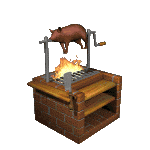

A New Village in the Village
They arrive for the holiday season by train, ferry, and coach, in gratifying numbers, because the village has developed a reputation as the place to be at Christmastime. After all, it's the same village that once held a holiday parade ... hosted a winter Olympics ... and most recently, put on a charming and fun Winter Fest. There is always something to see and to do there, and the expenses for a stay-over are far more reasonable than in nearby cities.
The 2019 Christmas mantel. For closeups, click on the Church and each of the twelve
houses.
For a widescreen version of this mantel village, click here.
 Last year, after moving heaven and earth (and quite a lot of ocean silt), Mayor Albert Pittman realized a long-standing ambition: a dredged harbor deep enough to accommodate the kind of ships' traffic that can transform a sleepy village into a hub of activity. To be sure, the village is still a long way from rivaling Boston or New York or even Providence as a major seaport a very long way. But it's doing surprisingly well for such a small village, with signs of expansion everywhere. New shops have opened. A candy factory has been established. An impressive stable has been built to board the horses of wealthy newcomers who have bought vacation homes in town. People are coming and going all year long, and many of them are repeat visitors.
Last year, after moving heaven and earth (and quite a lot of ocean silt), Mayor Albert Pittman realized a long-standing ambition: a dredged harbor deep enough to accommodate the kind of ships' traffic that can transform a sleepy village into a hub of activity. To be sure, the village is still a long way from rivaling Boston or New York or even Providence as a major seaport a very long way. But it's doing surprisingly well for such a small village, with signs of expansion everywhere. New shops have opened. A candy factory has been established. An impressive stable has been built to board the horses of wealthy newcomers who have bought vacation homes in town. People are coming and going all year long, and many of them are repeat visitors.
The Stumble Inn (House 1):
The Stumble Inn is one of the most popular lodgings, mostly because of Mrs. McGillicutty's delicious and hearty breakfasts. Mrs. McGillicutty is a hard-working woman who one day hopes to have an inn of her own. For now, though, she prepares breakfast three days a week for the owner of the Stumble Inn before returning to her day job as a live-in laundress. Not many ladies work harder than Mrs. McGillicutty!
Among the arrivals at the inn are a mother and her flame-haired daughter, both eager to register and then take in events. Alas, they can't agree on what to do first. The mother would like to stay around and listen to the concert band once they're tuned up. But her daughter Imogene has other ideas.
Exasperated, her mother says, "Imogene, I did not say we would drop everything and race to the other side of town to see Santa's Village immediately. We have plenty of time."
"Oh, but please? Please please please?" The child looks positively tragic.
With a sigh, the mother relents; she, too, was once a child in love with all things Christmas. "At least let's go inside and clean up first. And you have chocolate on your bonnet! How ever did it get there?" She wonders if the innkeeper will have something that can take it out.
The newsboy who moves around town hawking his papers has stationed himself in front of the inn; he knows exactly when the ferry arrives and can count on the train to be on time nowadays. He will not return home until he has sold off his lot. He knows a customer when he sees one, and there are at least three in view among the arrivals.
Take lodging, for example. Mayor Pittman may not have risen as high as he would have liked in politics (the loss in his race for the Senate still stings), but he's a shrewd businessman. He's persuaded the City Council to allow homeowners to rent their spare rooms without having to pay lodging taxes, and as a result, bed and breakfasts abound. Eventually there will be a smart new hotel an investor is currently eyeing the old granary with a view to transforming it into just such a venue but for now, the houses and inns in the village are booked well in advance.
 "Mommy, mommy! Can't we go see Santa's Village first? It's all anyone can think about. Everyone in school! Why can't we go there first? You said!"
"Mommy, mommy! Can't we go see Santa's Village first? It's all anyone can think about. Everyone in school! Why can't we go there first? You said!"
Father Andrew and Father Joseph form a plan (House 2 and the Church):
"I suppose you're right. I did have everyone practice Jingle Bells," Father Andrew admits as the musicians tune their instruments. "I'll pass the word to them to add the song; everyone likes that one. It's quite spirited, don't you think? It should add to the merriment."
Brother Joseph smiles and says, "If you have any sleigh bells, I'll be glad to ring them while they play."
So. They have a plan.
 The crush of guests arriving at the Stumble Inn are just in time to hear the practice warm-up of Father Andrew's choir. The caroling recital is something new this year, aimed at Father Andrew is a little embarrassed to say tourists. There will be a lively mix of sacred and secular songs, from Silent Night to Jolly Old Saint Nicholas. Donations will be actively solicited to make repairs to the church's steeple. Father Andrew has had mixed feelings about what he considers a "temporal" event. "It's pandering, I fear," he tells Joseph, a Franciscan and his oldest friend. "You are not pandering, Andrew," his friend argues. "At the friary we sell honey from our bees, and jams from our fruit trees. How else can we provide for ourselves as well as the poor?"
The crush of guests arriving at the Stumble Inn are just in time to hear the practice warm-up of Father Andrew's choir. The caroling recital is something new this year, aimed at Father Andrew is a little embarrassed to say tourists. There will be a lively mix of sacred and secular songs, from Silent Night to Jolly Old Saint Nicholas. Donations will be actively solicited to make repairs to the church's steeple. Father Andrew has had mixed feelings about what he considers a "temporal" event. "It's pandering, I fear," he tells Joseph, a Franciscan and his oldest friend. "You are not pandering, Andrew," his friend argues. "At the friary we sell honey from our bees, and jams from our fruit trees. How else can we provide for ourselves as well as the poor?"
Little Lily wants to play the double bass (House 2):
 Little Lily has always been entranced by music, any kind of music. Partly that's because her mother likes to sing as she cooks in the kitchen, and partly because her father is choir master at Father Andrew's church and also plays the double bass. He's a big man with a big instrument, and Lily has always been awed by the low-pitched sounds that pour out of it; they sound like a nest of buzzing hornets in a fury of flight. One day, Lily hopes to learn to play the bass herself. She just needs to grow a little taller, and maybe a little wider, to fit her arms where they need to be. Lucky for Lily, her father has promised to teach her how to play in the not-too-distant future. For now, still much too little in either direction, Lily has to be content to stand on her front stoop with her doll and listen with a child's devotion to her father's playing. Still, she can't help feeling frustrated. Why does it take so long to grow?
Little Lily has always been entranced by music, any kind of music. Partly that's because her mother likes to sing as she cooks in the kitchen, and partly because her father is choir master at Father Andrew's church and also plays the double bass. He's a big man with a big instrument, and Lily has always been awed by the low-pitched sounds that pour out of it; they sound like a nest of buzzing hornets in a fury of flight. One day, Lily hopes to learn to play the bass herself. She just needs to grow a little taller, and maybe a little wider, to fit her arms where they need to be. Lucky for Lily, her father has promised to teach her how to play in the not-too-distant future. For now, still much too little in either direction, Lily has to be content to stand on her front stoop with her doll and listen with a child's devotion to her father's playing. Still, she can't help feeling frustrated. Why does it take so long to grow?
The Concert Band (House 2 and the Church):
Harmony has absolute faith that her husband will be up to the challenge. Eventually. "He's not quite there yet," she admits to Dorothea Sparks, who has halted her carriage for a friendly chat. "But he's already very good. And the state competition isn't until June, after all; that's another six months that he'll be able to practice. In the barn," she adds. (By now, Harmony has heard some of Will's repertoire one too many times.)
Dorothea pulls her blue sleigh blanket more snugly over her lap. "He's a man of many talents. How he managed to get all of that funding for repairs to the school is a miracle in itself. By comparison, learning to play the horn must seem like child's play to him."
"Will always gets what he goes after," Harmony agrees with a smile and a shrug. Sometimes it's hard for her to remember how shy and hesitant he was when first he courted her. "And how fares the captain of the Contessa?" she asks Dorothea. Everyone knew that Dorothea and the captain were seeing one another whenever his ship was in harbor.
"How has it come to this, man?" Fred asks his old friend, shaking his head. "Once we would likely have spent the evening at the pub with our cigars. Now? We're going to be babysitting while the women go off shopping. Where are they, anyway?" Fred wonders, glancing at his pocket watch. "They're late."
"Five will get you ten that they're still at that Santa's Village," Russell says. "Ruth has been there with the young 'uns half a dozen times already. They cannot get their fill of Santa ... Mrs. Claus ... the elves ... the snowman band ... and of course the reindeer. Not to mention, presents! Candy! A sleigh full! It's no wonder that the town Santa will not be at City Hall this year, handing out treats. He can't compete!"
"How can they afford to pay to see the display that many times? Ruth's parents aren't exactly rolling in it."
"No one has to pay a nickle. The way I hear it, the gent who's set it up is rolling in it. He figures to be a kind of Santa Claus himself; he's an elderly widower who's always had that dream. He bought that big house last spring, as well as the house next to it, and set about creating the village right away. The mayor's behind it four square; it's one more thing to draw in the crowds."
"Well, God bless the man. What's his name?"
"Gerald Peters. There's talk hereabouts that he's a retired gambler. Or oil man. Possibly in the diamond trade. No one really knows."
"Or, I expect, cares." The two men share a chuckle together, and Russell takes a deep drag on his stogie. The cigar is probably the only thing he will ever have in common with the rich mystery mogul at the other side of town.
"But ... I don't drive," says Margaret.
"Where would we put it? The automobile stable is only large enough for one."
Clyde shrugs. "I suppose we will have to buy a bigger house with a bigger stable."
"And move again?" There is an unpromising tone in Margaret's voice.
"All right, then. We will tear down our stable and build a larger one," Clyde says, a little exasperated. "Someday, you know, all houses will have sheltering for two automobiles. Or even three."
"Clyde, no one would build such a folly. A shelter for three automobiles? What a notion!"
Clyde held his wife's hands and looked deeply into her eyes. "My dear Margaret. You are so naive."
As recently as the Fourth of July, the village band was a collection of skillful musicians who played beautifully together. But then things got tricky. The second violinist's betrothed fell in love with the French hornist and ran off with him, leaving a heartbroken violinist and an empty space where the hornist should be. It was a scandal, to be sure, but also a blow to Father Andrew's hopes to compete in the upcoming state competition in spring. No one knew what to do.
 Except Will Jenkins. Will had a solution. (Will always had a solution; he could fix anything.) Quite simply, Will would learn to play the French horn himself. He had always wanted to master an instrument and be part of the concert band, and while the horn would not have been his first choice, well, beggars couldn't be choosers. So for half a year, Will had worked hard mostly in his new barn, where he couldn't be heard by the family to learn how to play the horn. It wasn't easy. The French horn is one of the most difficult instruments to master. You needed really good lungs, and if you placed your lips just a little bit off, then you missed notes. But Will understood that when and if he mastered the higher tones, he would be making the most beautiful music anyone had ever heard. That's what he has been promising his wife for half a year.
Except Will Jenkins. Will had a solution. (Will always had a solution; he could fix anything.) Quite simply, Will would learn to play the French horn himself. He had always wanted to master an instrument and be part of the concert band, and while the horn would not have been his first choice, well, beggars couldn't be choosers. So for half a year, Will had worked hard mostly in his new barn, where he couldn't be heard by the family to learn how to play the horn. It wasn't easy. The French horn is one of the most difficult instruments to master. You needed really good lungs, and if you placed your lips just a little bit off, then you missed notes. But Will understood that when and if he mastered the higher tones, he would be making the most beautiful music anyone had ever heard. That's what he has been promising his wife for half a year.
 "The captain comes, and the captain goes," Dorothea says with a sigh. So far, she has not been able to keep him from going. Perhaps she never would, which only made the man that more intriguing. " I do enjoy his company when he's here." That is all she permits herself to say.
"The captain comes, and the captain goes," Dorothea says with a sigh. So far, she has not been able to keep him from going. Perhaps she never would, which only made the man that more intriguing. " I do enjoy his company when he's here." That is all she permits herself to say.
 Not far from them, two young men, pals from college, are taking stock of the concert band. Once upon a time, they would have been found nowhere near a musical event that did not include dancing, but Russell and Fred are not the gadabouts they once were. They are waiting patiently for, of all things, children. A bunch of them. The current and possibly forever love of Russell's life, Ruth, will be hauling several of her young siblings in tow, and Fred's wife will be pushing a baby carriage with a couple of toddlers in it.
Not far from them, two young men, pals from college, are taking stock of the concert band. Once upon a time, they would have been found nowhere near a musical event that did not include dancing, but Russell and Fred are not the gadabouts they once were. They are waiting patiently for, of all things, children. A bunch of them. The current and possibly forever love of Russell's life, Ruth, will be hauling several of her young siblings in tow, and Fred's wife will be pushing a baby carriage with a couple of toddlers in it.
 A year ago, Clyde went off to Chicago to see about selling a small stockyard that he'd inherited and didn't know what to do with. What he did with it was to sell it, and now he he has to figure out what to do with the new stack of money that's fallen into his lap. (Is there anyone in history who is luckier than Clyde?) "We should buy a second car, just to treat ourselves," Clyde suggests to his wife.
A year ago, Clyde went off to Chicago to see about selling a small stockyard that he'd inherited and didn't know what to do with. What he did with it was to sell it, and now he he has to figure out what to do with the new stack of money that's fallen into his lap. (Is there anyone in history who is luckier than Clyde?) "We should buy a second car, just to treat ourselves," Clyde suggests to his wife.
 "No matter. We can always use a spare automobile," her husband argues.
"No matter. We can always use a spare automobile," her husband argues.
An unexpected development (House 5):
It is now nearly two years since Johnny Hooks was swept overboard from a Gloucester fishing schooner in the dead of winter. Two years, that his wife Sonja has been grieving. Two years, that old Farmer Hooks has been running the farm himself again and finding extra work where he may. Two long years, that midwife Grace Greene has been comforting Sonja and accompanying her to the village's busy harbor, asking every sailor and crew member they see whether they have any news of Johnny Hooks.
Two years, with not a word, not a clue. The village has moved on, carrying with it the sad memory of a man well loved. And then one day, one completely unlikely, unexpected, unbelievable evening ... there is a knock on the door of Grace Greene and her physician husband. Grace opens the door to find a barrel-chested figure in a navy pea coat and with a wool watch cap pulled low over his head. The light is dimming, but the figure is unmistakable. Johnny Hooks is standing before her looking older, with a face more weathered than before, but unmistakably, inexplicably, joyfully alive.
"Johnny! How ?"
The sailor glances left and right into the darkening street and then says quickly, "May I come in, Miz Greene? I wish not to be seen yet."
"Of course!" She grasps his hands and pulls him inside, calling her husband from his study. "Nick, Nick, come here! Come see!"
The doctor emerges, reading glasses perched atop his head, and is as dumbfounded as his wife is to see the living miracle standing before them. "Good heavens! Johnny! Where have you been, man?" Nicholas Greene's own face registers shock, joy, and more than a little bit of suspicion. Could the boy have gone off on a lark? Jumped aboard a whaler without telling anyone? Been pressed into service aboard a vessel that had more wicked purpose?
"We know that, Johnny. Knocked into a freezing sea in a full gale and in pea-soup fog. We know all that," Doctor Greene says impatiently. "But what after?"
"I don't rightly know, sir. I woke up in a strange bed. I didn't know who I was, where I was, why I was. I could carry on talk, all right, and I had a belief that I were working aboard a ship. But that were all. The landlord and his missus told me only that two crewmen off some vessel carried me to their place a boarding establishment as it were the nearest to where the ship dared drop anchor safely. They did not catch a name."
"What of the ship? What name there?"
Grace was wide-eyed with wonder. "Amnesia. You had amnesia, Johnny!"
"So they told me," Johnny said, shaking his head. He looked as if he could not believe it himself.
"Retrograde amnesia, it sounds like," the doctor said softly. "Rare, but it happens."
"But how did you come to know who you really are? What did they call you in the meantime?"
"Oh, Johnny of what?" Grace blurted. She saw a tear fall onto his jacket's lapel and lay there glistening, and then she realized: he was afraid that Sonja had forgotten him. It was a ridiculous idea, as well Grace knew. "Sonja has mourned you every minute of every day since she heard the report of your disappearance. If only you knew!"
She proceeded to fill Johnny in on Sonja's endless, mournful search for news of him, while Doctor Greene gingerly painted a picture of a young woman whose health was becoming increasingly fragile. Johnny had to be prepared for that.
"Will ye come with me, Miz Greene? I know the sight of me might be a consternation to her, and I would feel better if you were there. It's why I've come here first, without being seen."
"Of course, dear boy." Grace glanced at the grandfather clock in the hall. "It's still early. Sonja is with my cousin, right now, in
my old house; she'll be returning to the farm as soon as your father has finished hauling his last sleigh-load of children to Santa's Village."
"Santa's ?"
"I'll explain on the way," Grace said, grabbing her coat and scarf from the hall tree. "We can easily walk there; no need for a carriage," she said, waving away her husband's offer. It was dawning on her that this was going to be the best Christmas ever, not only for Sonja and Johnny's father, but for the entire village. She could hardly contain her happiness. "Let's hurry!"
Which is why we find the tax collector (and his young son, training to follow in his father's footsteps) assessing the value of the automobile that's parked in front of one of the nicer houses in town. The owner is apparently attending one of the nearby events in the village on foot, which makes the job easier for the tax collector. He makes note of the model and the condition and the size of the automobile, with his son dutifully copying his effort on his own note paper.
"Father," the young boy asks, "do you think we will ever have an automobile of our own?"
"Not in my lifetime, son," the tax collector admits. "But if you work hard and save "
"I will do that! And I will buy the biggest, fastest automobile that they make. And I will take you and mother for a long ride in the country. We shall go so fast!"
"But the roads will be much improved by then, will they not?"
The tax collector gives a little shrug and says, "They will, if the mayor has his way." In fact, Mayor Pittman was working hard to find funding somewhere, somehow, to throw at that very project. He has told the tax collector more than once that the future lies with the automobile. The tax collector has long admired the mayor's vision; he is the right man for the right job. Not to mention, he's the one who hired the tax collector in the first place.
But first, some history:
 An odd expression comes over Johnny's face. He doesn't know quite how to begin; that is obvious. His eyebrows draw down, as if he were working on a particularly hard math problem. He sighs. "The thing is, I were knocked overboard when a boom jibed "
An odd expression comes over Johnny's face. He doesn't know quite how to begin; that is obvious. His eyebrows draw down, as if he were working on a particularly hard math problem. He sighs. "The thing is, I were knocked overboard when a boom jibed "
 "They did not learn that, either. But I know this much: someone off that ship hauled me, out cold, from the deep and saved my life. I been trying to find out who that was these last two year, nor will I rest until I do."
"They did not learn that, either. But I know this much: someone off that ship hauled me, out cold, from the deep and saved my life. I been trying to find out who that was these last two year, nor will I rest until I do."
 "Ishmael." Johnny looks sheepish. "They called me Ishmael because of I survived the savage sea. Like in the book. As for how I came to know I'm Johnny Hooks, it come on kind of gradual. I would remember sommat -- little bits and pieces. And then three days ago, I were watching some folks skating on a pond, and one of 'em were a young lady, a better skater by far than all of the others, and it come to me like a bolt of lightning: Sonja! I be married to the best and most beautiful skater in all God's kingdom. And here I've abandoned her these two year, and she without me, thinkin' I don't know what ... I'm so afeared," he confessed.
"Ishmael." Johnny looks sheepish. "They called me Ishmael because of I survived the savage sea. Like in the book. As for how I came to know I'm Johnny Hooks, it come on kind of gradual. I would remember sommat -- little bits and pieces. And then three days ago, I were watching some folks skating on a pond, and one of 'em were a young lady, a better skater by far than all of the others, and it come to me like a bolt of lightning: Sonja! I be married to the best and most beautiful skater in all God's kingdom. And here I've abandoned her these two year, and she without me, thinkin' I don't know what ... I'm so afeared," he confessed.
 And so it is that a two-year, dreadful journey through darkness by one of the town's most endearing couples is ending in a moment of sweetness and light. Johnny Hooks has come home at last to his beloved.
And so it is that a two-year, dreadful journey through darkness by one of the town's most endearing couples is ending in a moment of sweetness and light. Johnny Hooks has come home at last to his beloved.
Mayor Pittman is always reluctant to push for heavier property taxes the easiest way to get unelected but he has little problem levying taxes on the luxury items of people of means. Taxing houses penalizes every homeowner, unfortunately, but almost no one has an automobile except the very richest in the village, who would not dare complain too loudly.
 "You will, will you? Well, it will not be so fast. The roads will never allow you."
"You will, will you? Well, it will not be so fast. The roads will never allow you."
 Near them, Jack Jones and his wife Miss Bates (as the village still calls her) are on their way to the concert recital when they encounter Max Schurster, the town's banker. Jack is glad of the encounter; he wants to gently press the banker about the possibility of a loan to do some much-needed repairs to his house. The only problem is that Boots, their one-eyed, friendly, loveable ex-sheep dog, doesn't like Max. Never has, never will. It's just a thing with him. Boots lets out a low growl that is more suspicious than menacing, but ... there go the chances for a home loan.
Near them, Jack Jones and his wife Miss Bates (as the village still calls her) are on their way to the concert recital when they encounter Max Schurster, the town's banker. Jack is glad of the encounter; he wants to gently press the banker about the possibility of a loan to do some much-needed repairs to his house. The only problem is that Boots, their one-eyed, friendly, loveable ex-sheep dog, doesn't like Max. Never has, never will. It's just a thing with him. Boots lets out a low growl that is more suspicious than menacing, but ... there go the chances for a home loan.
The still-empty granary and still more negotiations (Houses 7 and 13):
That man is at hand and is at that very moment having a conversation with Mayor Pittman about the potential he sees in the dusty, mice-ridden building. Developer Silas Tempkins has been slowly but surely acquiring land on the outskirts of the village (although old Farmer Hooks has predictably turned down his offer to acquire the farm). But besides land in the country, Silas would like a piece of the town center to add to his real estate portfolio as well.
"It's a miracle that you haven't had a dust explosion before now," he tells the mayor. (Clearly he is negotiating.) "Why, it would be nothing less than a disaster to have the granary blow up and take the hospital and city hall with it!"
"I see little chance of that," the mayor counters. He's known such negotiating ploys before. "I've had Sam Rickens working carefully to sweep it clean of grain dust for more than a year now. The granary is safe."
"You assume." The two men are standing on the balcony of the village's newest resident, the mystery mogul Gerald Peters, after accepting his invitation to view the Christmas fantasy land that he has created. Among the elves, snowmen, reindeer and of course Mr. and Mrs. Claus are many visiting children, more than live in the village. The mayor is delighted to see that. Children show up with parents, and parents are willing and able to spend money on lodging, dining, and gifts.
Now, if the granary were able to be converted into a hotel as Silas Tempkins proposes, why, that would be another feather in the mayor's cap and another source of income for the village. The mayor finally says with a bland expression, "So, Mr. Tempkins, suppose you show me your preliminary plans for this conversion."
"With pleasure, sir. Let's return to your office at City Hall, and I'll lay it all out before you."
Mrs. Woodcut is feeling a little melancholy today. "I have been thinking of Sonja, dear husband," she admits. "The girl looks more poorly than ever. Why, Grace will not let her stay alone at the farm, that's how poorly she looks; she stays with Grace's cousin when her father-in-law Hooks is in town, as now he is. But what can be done? How do you mend a heart that's been broken in two?"
Her husband quaffs his ale and then presses his lips together in thought. "My dear, you don't," he says at last. "That's the long and the short of it. For that particular lass? It would surely take a miracle."
Little did the Woodcuts know that the miracle was taking place even as they spoke.
Yes, the granary still lies empty. Contrary to popular opinion, it has not been converted to an ale house, and no one is growing mushrooms in it. Some buildings are like that; stripped of their original purpose, they resist being made into something useful, current, and more to the point profitable. Sometimes such structures are simply torn down; the land they sit on is more valuable than the building that sits on them. On the other hand, sometimes along comes a developer with a glint in his eye who is convinced that he, and he alone, can make something out of nothing.
 And in the meantime, Lavinia Pittman has her driver hurrying her carriage along. She has been delayed from attending the meeting with Mayor Pittman and the developer, and she is not happy about it. Lavinia has her own thoughts about converting the granary into a hotel. (For pity's sake, it will need gobs more windows, and she wants the exterior of the building painted a very certain shade of blue). "Driver! Do hurry!"
And in the meantime, Lavinia Pittman has her driver hurrying her carriage along. She has been delayed from attending the meeting with Mayor Pittman and the developer, and she is not happy about it. Lavinia has her own thoughts about converting the granary into a hotel. (For pity's sake, it will need gobs more windows, and she wants the exterior of the building painted a very certain shade of blue). "Driver! Do hurry!"

 Once again, the hospital grounds have been pressed into service. The lighting is good, the location is good, and there is plenty of room to set up individual stalls. There are sausages, there's hot tea, there's hot cider, and there are the Woodcuts. The Woodcuts never, ever, miss an event that features either food or drink. Mostly they appreciate drink. Some have wondered how it is that the couple manage to imbibe so much without seeming to have done so. "The answer is simple," Mr. Woodcut once confided to a curious friend. "Keep the belly full, and the head is bound to stay clear."
Once again, the hospital grounds have been pressed into service. The lighting is good, the location is good, and there is plenty of room to set up individual stalls. There are sausages, there's hot tea, there's hot cider, and there are the Woodcuts. The Woodcuts never, ever, miss an event that features either food or drink. Mostly they appreciate drink. Some have wondered how it is that the couple manage to imbibe so much without seeming to have done so. "The answer is simple," Mr. Woodcut once confided to a curious friend. "Keep the belly full, and the head is bound to stay clear."
City Hall is closed today (House 9):
"But don't use the word 'attracted,' understand?" Alice had warned her brother. "Just say I'm 'interested.' No don't say that, either! Say I really appreciate his poems. No that won't work; he never signs them! Oh, what is a girl to do? This is maddening. Steven is like a ... a clam. He shuts up tight if he feels the slightest disturbance near him by me. But he never used to be that way! He was a lot of fun when we were younger."
"Ah, just tell 'im you like 'im. What can it hurt?"
"You dolt! You know nothing, absolutely nothing, about ... about anything! Give me my money back. You are the wrong person for this."
"Nope," Eddy had told her. "A deal is a deal." (And anyway, he'd already spent all the money.) "I'll figure out something to say. Leave it to me."
And, no surprise, now Steven is late. Will he even show up? He probably has his nose in a book somewhere. Eddy bends over to re-tie his eternally untied shoe. It was beyond him how a few scribbled poems could enthrall his sister that way. He himself had never read a poem in his life. They never made any sense to him. I'll give Steven ten more minutes.
Well, Farmer Hooks, you shall have your pipe and your winter fire before you know it ....
Normally a bustling place with citizens coming and going, today there are no comings, no goings. Which is the very reason that Alice's brother Eddy has arranged to meet with Steven Jamison on its front steps: they would not be bothered there. Eddy is on a mission. A paid mission. Alice has handed over her wages from two babysitting assignments (negotiated down from three) for her brother to let the shy, introverted Steven who writes beautiful poetry (so Alice claims) know that she is attracted to him.
 Not far from Eddy, old Farmer Hooks is hauling a series of sleds topped by a series of children. How many trips today? he asks himself. He's lost count. Who knew there were so many children in New England? Praise heaven he retired his old mare to pasture. She never could have kept up. The new mare seems to handle the screaming, lively crowds just fine, which is more than old Hooks can say for himself. He was tired! And yet, he had no choice; he needed to take whatever paying work came his way.
Not far from Eddy, old Farmer Hooks is hauling a series of sleds topped by a series of children. How many trips today? he asks himself. He's lost count. Who knew there were so many children in New England? Praise heaven he retired his old mare to pasture. She never could have kept up. The new mare seems to handle the screaming, lively crowds just fine, which is more than old Hooks can say for himself. He was tired! And yet, he had no choice; he needed to take whatever paying work came his way.
 If Johnny were here, things would be different. He could be doing this, and I could be home, pulling on a pipe and with my feet up before a nice winter fire.
If Johnny were here, things would be different. He could be doing this, and I could be home, pulling on a pipe and with my feet up before a nice winter fire.
The neighbors have mixed feelings (Houses 10 and 11):
Smoothly for the children, perhaps. But some of the neighbors have other thoughts. Their once-serene neighborhood has been completely transformed. Now they are forced to endure more traffic in sleighs and carriages, not to mention the constant squeals of excited children of all ages. In the house farthest from the display, a mellow dog is perfectly fine with the cheery scene before him; it is so much more interesting than lying in his dog house and waiting for the postman to come by. However, the woman knocking at the door of his master is not nearly as tolerant. She has a petition in her hand and is seeking signatures of protesters to what she calls "this never-ending Christmas chaos."
Returning home to the nearby scene is pure pleasure for her. Miss Martha and the mystery mogul Gerald Peters are in complete accord: Christmas is for children.
Mystery mogul Gerald Peters chose carefully when he settled on the imposing house and its red-gabled neighbor for the location of his long dreamed-of Santa's Village. The grounds are ample for his displays, and the cheery red house is a perfect staging area for the real, live helpers in elf suits who make certain that everything flows smoothly among the steady groups of children who visit.
 On the other hand, a nearby house is owned by a lady who is much more sympathetic to the whole idea of children enjoying the innocence of the season: Miss Martha. She loves to hear the laughter, loves to see the bright colors and to hear the cheery music that echoes across the displays. (She's learned that one of the elves hides inside the red house, cranking a Victrola.) She has also realized that there are far too many children for her to make her famous homemade peppermint candies for all of them, and so she has done the logical thing: invested in a small factory to create not only peppermints in all possible shapes, but other candies as well, like nougat, sour drops, gum drops, cat's eyes and kisses.
On the other hand, a nearby house is owned by a lady who is much more sympathetic to the whole idea of children enjoying the innocence of the season: Miss Martha. She loves to hear the laughter, loves to see the bright colors and to hear the cheery music that echoes across the displays. (She's learned that one of the elves hides inside the red house, cranking a Victrola.) She has also realized that there are far too many children for her to make her famous homemade peppermint candies for all of them, and so she has done the logical thing: invested in a small factory to create not only peppermints in all possible shapes, but other candies as well, like nougat, sour drops, gum drops, cat's eyes and kisses.
The North Pole has moved south (Houses 12 and 13):
Mickey Sullivan, surely the most enterprising , business-oriented young man the town has ever produced, has found seasonal work with the mystery mogul. His job it's so easy that he almost feels guilty getting paid to do it is to round up whatever children he can find, boy or girl, any age, and encourage them to come to Santa's village. He's good at that sort of thing. The petition lady, however, sees it differently. From the porch where she waits to be admitted inside, she calls over to him. "Must you shout at the top of your lungs?"
"Yes, m'am," Mickey shouts back agreeably. "That's what they're payin' me for."
Sighing with exasperation, the woman looks over her petition. There aren't nearly enough signatures on it to have any influence with the mayor. How can people bear such disruption? It is just so awful. Rolling her eyes with a look heavenward, she reminds herself that the village is only seasonal. (Unless rumors to the contrary are true.)
Abby and Annie, best friends forever, have themselves decided to check out Santa's Village. "We're kind of too old for this, you know," Annie admits. "But I just want to see what all the fuss is about. We won't accept any gifts. Maybe a bit of candy, though."
"That is an excellent plan," Abby says quickly. "I did hear someone mention nougats ...."
At the far end of the village, Jeffrey and Jimmy are up to their old tricks, which is to say, up to no good. Not content to stuff their pockets with all the candy the elves allow them, they have decided to sneak more from the mother lode itself in Santa's sleigh. Up onto Jimmy's shoulders goes Jeffrey (he has bigger pockets), and into the candy he dives.
The boys are out of view of the elves, but not of Big Billy. Billy is forever amazed at the brothers' boldness. There is nothing they won't do, nothing they won't try. If they see something, and they like it ... look out. Sometimes most times they're breaking some rule or other, whereas Big Billy has never broken a rule in his life. But that's all right with him. When he did join the brothers on one of their escapades during the village's Winter Olympics, he was exhausted for the whole week after. And what they did wasn't even wrong. Not really.
Billy smiles at the memory of it, and his smile is reflected in every face of every child romping around him through Santa's Village.
So many children, so much joy, and all because of a generous man with the soul of a child.
"This is such a happy place, Mr. Peters!" the boy cries, giddy with joy. "I think it's happier than any place in the world!"
The startled mogul smiles and says, "I'm glad you're enjoying it, son."
"Yes! I am! And you know what? I like you even better than Santa Claus!"
That, too, was unexpected. Teary-eyed, Gerald Peters tells him, "You've made an old man very happy, my boy. Now go and enjoy your day. I hope the elves have been good to you?"
"Oh, yes, sir," the boy says, patting his bulging pockets. "And to all of my sisters and brothers, too!"
"Good. A Merry Christmas to you."
"And to you, sir. God bless you." The lad turns on his heel and dashes out the door at the same speed he entered: full.
And so it is that the sleepy village, much less sleepy than the year before, finds itself ... much more happy than the year before.
 The youngest children have been told that Santa has sent down some of his worker elves from the real North Pole to kind of set the scene for Christmas. Santa Claus himself will not appear until Christmas night, of course. But in the meantime, in this recreation of the North Pole, the children can climb up on the make-believe reindeer and run in and out among the make-believe snowmen (which have been painted by the finest artist that the mystery mogul Gerald Peters was able to commission). Santa and Mrs. Claus are make-believe, too; the children can see that with their own eyes. But the candy is real, and so are the teddy bears and ice skates and baby dolls and ribbons and tablets and jacks and games of all sorts. And the best part is, Santa's toy sacks keep filling back up overnight. It really is a miracle!
The youngest children have been told that Santa has sent down some of his worker elves from the real North Pole to kind of set the scene for Christmas. Santa Claus himself will not appear until Christmas night, of course. But in the meantime, in this recreation of the North Pole, the children can climb up on the make-believe reindeer and run in and out among the make-believe snowmen (which have been painted by the finest artist that the mystery mogul Gerald Peters was able to commission). Santa and Mrs. Claus are make-believe, too; the children can see that with their own eyes. But the candy is real, and so are the teddy bears and ice skates and baby dolls and ribbons and tablets and jacks and games of all sorts. And the best part is, Santa's toy sacks keep filling back up overnight. It really is a miracle!
 As he has every day since he opened his Santa's Village to the village, Gerald Peters hangs back, not wishing to intrude on the children's free-spirited play. Inside the house, working his accounts at his desk, he's content to know that he has made a great number of young ones happy. He isn't at all prepared for a young boy in blue (the eight-year old who accidentally burned down his parents' house) come rushing through the front door, throwing his arms around the elderly man's chest in a childish, awkward hug.
As he has every day since he opened his Santa's Village to the village, Gerald Peters hangs back, not wishing to intrude on the children's free-spirited play. Inside the house, working his accounts at his desk, he's content to know that he has made a great number of young ones happy. He isn't at all prepared for a young boy in blue (the eight-year old who accidentally burned down his parents' house) come rushing through the front door, throwing his arms around the elderly man's chest in a childish, awkward hug.